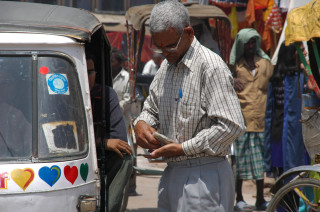“Bhaiya, change nahi he”, are some of the most commonly used words in our daily life. They affect our daily transactions and prove to be a daily problem. Whether it is a rickshaw ride or a snack in the cafeteria, the persistent problem of change continues to pester us all. It isn’t unusual to be in a hurry and to not have change at that very moment. The problem of change can not only delay you, but it can also loot you whenever you don’t have a note whose worth is less than Rs. 100 and when you’re in a hurry to attend an important meeting that could lead to your promotion or demotion. At that moment, due to the lack of change, you give up a huge chunk of your money. A loss that is unnecessary. A loss that didn’t have to be incurred if only the problem of change had been solved.
I’m sure that by now you would have figured out that I’m not talking in terms of the good or bad change that we need to bring about in this world. I am talking about the monetary change, that is, the small denominations of money that we have to scrounge our wallets for whenever we have to pay for a certain good purchased or service availed. The change that desperately needs a change in system.
The problem of change is not uncommon. And just like every other loop in the market, it has been dealt with. One of the most popular methods is the method which incorporates the concept of mobile banking. An example for the same is M-PESA, which was a mobile banking service that was introduced by Safaricom in Kenya. The concept of M-PESA was introduced in 2007 and ever since it has revolutionized trade in Kenya. In fact, today the mobile transactions account for more than 20% of the Kenyan GDP with more than 15 million active customers. It has been able to target not just the urban sectors, but has also helped in using micro-financing tools to promote financial inclusion in rural sectors. Countries such as Afghanistan which adopted this have seen a fall in the corrupt practices and thus money is being channelized to those who deserve it or have earned it.
One then starts to wonder why a developing country such as India hasn’t adopted this concept. It may come as a surprise, but M-PESA was introduced in India by Vodafone in partnership with ICICI Bank. However, it has not expanded as expected due to the stringent banking regulations that are prevalent in India. One cannot do much about the banking regulations, but one can always start using M-PESA and spread the word about it. So when are you planning to get your M-PESA account?
































